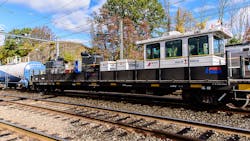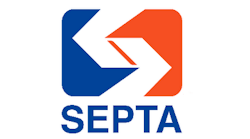The shift in color of the leaves is an indicator of autumn, as well as a unique season known to passenger rail operators as slippery rail season. It stretches between late-October and mid-December and is a time where extra vigilance to rail cleaning is needed, especially in areas with deciduous trees.
Slippery rail is caused by falling leaves that are crushed by rail wheels and deposit a residue called pectin on rails that reduces friction between wheel and rail. This loss of friction can be a safety hazard and transit agencies such as Southeastern Pennsylvania Transportation Authority (SEPTA) and New Jersey Transit (NJ Transit) are implementing tested strategies to remove the residue and keep trains operating safely.
"Getting our riders to their destination without delays or inconvenience is important, but the safety of our customers and employees always takes precedence," said SEPTA CEO/General Manager Leslie S. Richards.
When slippery rails occur on SEPTA’s system, train speeds are reduced, especially on inclines, declines and on approach to station platform areas. Additionally, night crews are deployed to clean tracks using a combination of water and gel along with high-pressure washing equipment that blasts away the residue. Sand is spread on the tracks to increase traction.
NJ Transit also utilizes a high-pressure power washing system known as AquaTrack. NJ Transit has been using the AquaTrack system since 2003 and added a second machine in 2016 to expand the coverage area.
The system consists of two 250-horsepower diesel-engine units mounted on a flat car with an operator control cab. Two pressure-pump units dispense water up to 20,000 pounds-per-square-inch directly to the top of the rail. The process uses 17 gallons of water per minute.
“Wet leaves on tracks can be extremely disruptive to rail service, especially in the fall,” said NJ Transit President & CEO Kevin S. Corbett. “Using the AquaTrack system, we are eliminating problems before they even occur, while taking the proactive steps to keep our service safe and reliable.”
Additional mitigation steps taken by NJ Transit include tree trimming and equipping trains to spray sand in front of their wheels for added traction.

Mischa Wanek-Libman | Group Editorial Director
Mischa Wanek-Libman is director of communications with Transdev North America. She has more than 20 years of experience working in the transportation industry covering construction projects, engineering challenges, transit and rail operations and best practices.
Wanek-Libman has held top editorial positions at freight rail and public transportation business-to-business publications including as editor-in-chief and editorial director of Mass Transit from 2018-2024. She has been recognized for editorial excellence through her individual work, as well as for collaborative content.
She is an active member of the American Public Transportation Association's Marketing and Communications Committee and served 14 years as a Board Observer on the National Railroad Construction and Maintenance Association (NRC) Board of Directors.
She is a graduate of Drake University in Des Moines, Iowa, where she earned a Bachelor of Arts degree in Journalism and Mass Communication.





